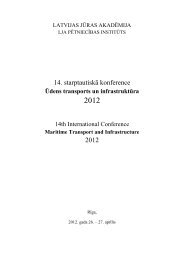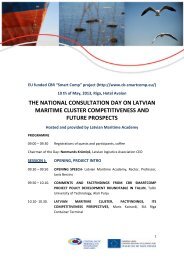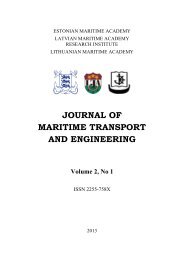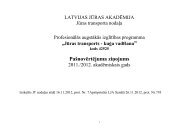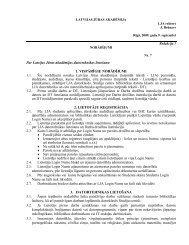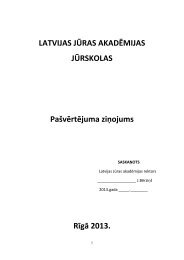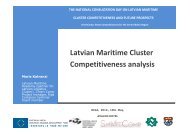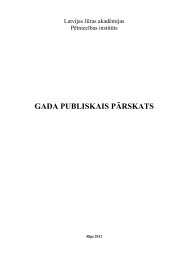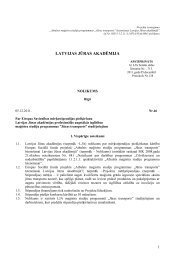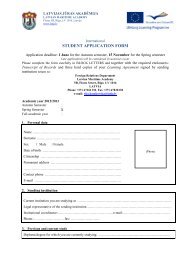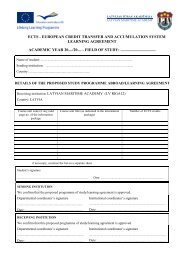Latvian Maritime academy
Latvian Maritime academy
Latvian Maritime academy
Create successful ePaper yourself
Turn your PDF publications into a flip-book with our unique Google optimized e-Paper software.
Students have made a phenomenological reconstruction of the sea perception mechanism. They<br />
described and characterized the phenomenological reconstruction by the practicality, maturity and<br />
didactic elements from the point of view of the maritime self-concept. Students expressed a perception of<br />
importance of maritime medicine. Their maritime self-concept expresses the well-being, cognitive<br />
aspirations, wellness activity and feeling of the self-esteem at the level of maritime medicine. Most<br />
students have accentuated natural development of their professional maritime self-concept.<br />
Students have characterized their pre-studies level as recreation, inexpressive marine behavior and<br />
untrained self-esteem. <strong>Maritime</strong> studies expanded searches of the professional identity of students. They<br />
behave more mature and valuable at studies. The vocational choice is tested in a practice, which<br />
professional activity trains a personality of the student, stimulates positive emotions, cognitive aspirations<br />
of safety, adequate behavior and self-esteem mostly.<br />
If seafarers are prepared in conditions of higher education system, it is important to comply with an<br />
integral process, which consists of three phases of the maritime self-concept – pre-studies, studies and<br />
practice. It is appropriate to train students universally and so improve their maritime self-concept as a<br />
basis of the personality value in the maritime state. The civil and professional maritime self-concept<br />
should be improved at strategic, tactic and operative levels of the constructive cooperation of the<br />
government, businesses and educational institutions from the point of integral view of the maritime<br />
society.<br />
Conclusions<br />
1. European maritime self-concept was characterized from the historical – ideological point of<br />
view. The personal sense of existential freedom is not based on the transcendence at the ideological level<br />
in the pre-monotheistic epoch. The monotheistic leap of self-consciousness in the Jewish civilization has<br />
opened a transcendental perspective of the maritime self-concept. Christianity formed the classic<br />
European mentality, which led to development of the maritime self-concept, the rise of universities from<br />
monastic libraries, development of the maritime geographic discoveries, science, global and universal<br />
education and the first maritime schools. Later the maritime self-concept was characterized by the formal<br />
pragmatism, only empirical science and too active marine functionalism on developing of commercial<br />
maritime fleets from the ecological point of view.<br />
2. Psycho-educational factors of the maritime self-concept development were revealed. Intuitive<br />
and creative mythologization of marine events stimulates development of the maritime self-concept. A<br />
virtual level of the contact with the sea brings psychological influence on the maritime self-concept. The<br />
direct experience of the sea gives natural, ontological, anthropological and psychological basis to improve<br />
the maritime self-concept. Marine education of the health enriches the personality. The main valuable<br />
condition of the education consists from surviving of the personal constructive autonomy. Seafarer’s<br />
personality is enriched, when he / she studies at the higher school. The vocational choice is tested in a<br />
practice, which professional activity trains a personality of the student, stimulates positive emotions,<br />
cognitive aspirations of safety, adequate behavior and self-esteem mostly. Empirical results can be<br />
applied only to the respondent population.<br />
There are directions of the students’ maritime self-concept development:<br />
– Improvement of maritime studies programs of higher schools in regard to the human capital and<br />
importance of the adequate ideological and psychological culture of the personality in extreme<br />
conditions of seafarer’s work.<br />
– Development of inter-disciplinary integration at the level of the maritime self-concept culture in<br />
higher studies programs of seafarers, and textbooks, and improvement of methodological<br />
directions of educational work with maritime students.<br />
– Determination of the hodegetical direction, content and structure of the maritime self-concept<br />
education, and creative modeling of development of the maritime self-concept of personality at<br />
formal – professional and informal levels from the point of view of the maritime science<br />
popularization as general socio-educational influence.<br />
References<br />
1. A campaign to attract entrants to the shipping industry. 2008. Available (accessed on<br />
18.02.2012): http://www.imo.org<br />
2. Beresnevičius, G. Ant laiko ašmenų. Vilnius: Aidai, 2002.<br />
26



